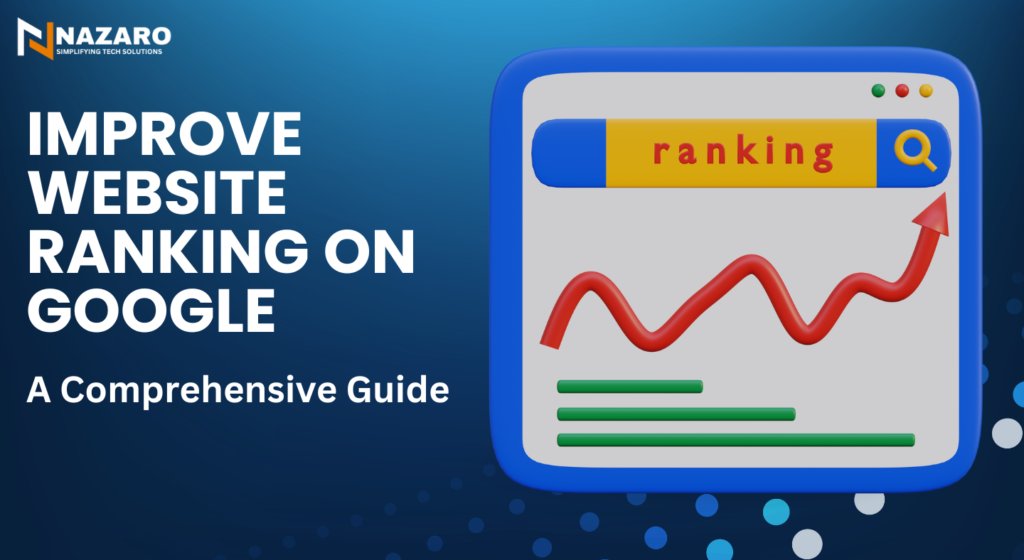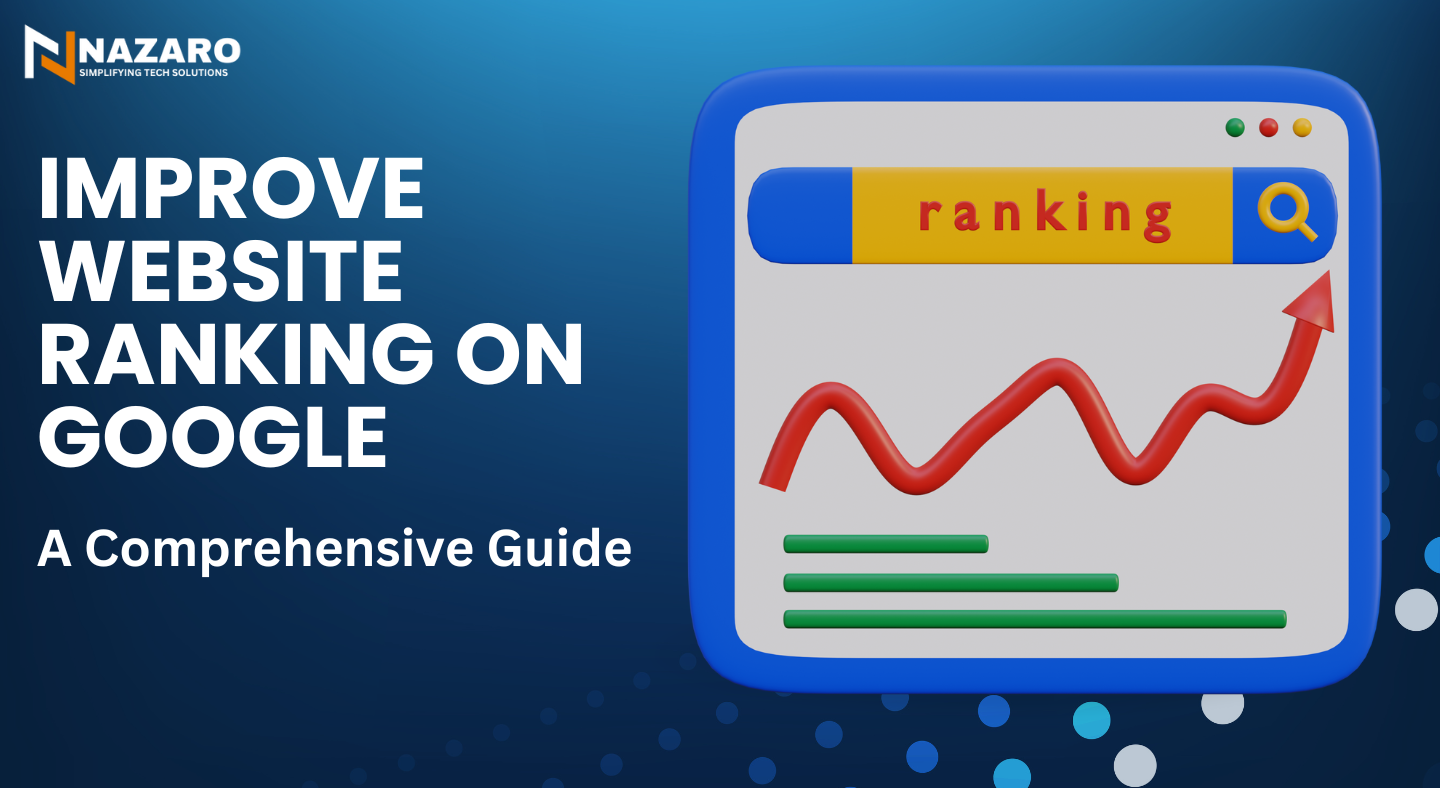
In today’s digital landscape, having a strong online presence is crucial for any business. One of the most effective ways to achieve this is by ranking higher on Google. Whether you’re a startup or an established company, getting to the first page of Google can dramatically increase your website traffic and conversions. In this detailed guide, we’ll walk you through proven strategies on how to rank higher on Google and boost your search engine rankings. Nazaro Technologies, a leading digital marketing firm, can help you implement these techniques effectively to achieve your SEO goals.
Why Is Website Ranking Important?
Before diving into the practical steps on how to improve website SEO, it’s essential to understand why ranking on Google matters. With over 90% of online experiences starting with a search engine, appearing on the first page of Google search results can significantly impact your brand visibility and drive more targeted traffic. If you’re not on the first page, you’re missing out on a massive amount of potential customers.
How to Rank Higher on Google: Actionable Tips
Let’s explore the top strategies that can help you increase website ranking and achieve a higher position on Google.
1. Optimize Your Website with Relevant Keywords
Keywords are the backbone of SEO. To rank higher on Google, you must use the right keywords that match your target audience’s search intent. Here’s how you can improve website SEO with effective keyword optimization:
Conduct Keyword Research: Use tools like Google Keyword Planner, Ahrefs, or SEMrush to find relevant keywords for your niche. Include long-tail keywords, as they often have lower competition and higher conversion rates.
Use Keywords Strategically: Place your target keywords in critical areas such as the title tag, meta description, header tags (H1, H2, H3), and throughout the body content. For example, if you want to rank for “Tips to rank on Google first page,” make sure it appears naturally in your content.
Focus on Search Intent: Understanding what users are searching for when they type in a keyword is crucial. Tailor your content to provide value and answer the specific queries your audience has.
2. Create High-Quality, Valuable Content
Content is king, and it plays a significant role in how Google ranks websites. To boost Google search ranking, you must provide content that is informative, engaging, and valuable to your audience.
Publish In-Depth Articles: Long-form content tends to rank better on Google. Aim for comprehensive guides (like this one) that cover a topic in-depth, providing actionable insights and examples.
Use Visual Elements: Include images, infographics, videos, and charts to make your content more appealing. Visual content not only increases engagement but also helps in boosting your website’s SEO.
Update Content Regularly: Fresh and updated content signals to Google that your website is active. Revise your old articles, add new information, and remove outdated content to maintain relevance.
3. Improve Website User Experience (UX)
Google considers user experience as a ranking factor. If your website offers a poor experience, users are likely to leave, increasing your bounce rate and hurting your SEO efforts.
Ensure Fast Loading Speed: Page speed is a critical ranking factor. Use tools like Google PageSpeed Insights to check your website’s speed and implement improvements. Compress images, use browser caching, and minimize JavaScript to boost loading times.
Mobile Optimization: With more than half of all web traffic coming from mobile devices, having a mobile-friendly website is essential. Ensure your site is responsive and offers a seamless experience across all devices.
Easy Navigation: Make it easy for users to find what they are looking for. Use a clear and intuitive site structure, with internal links to guide visitors to related content.
4. Build High-Quality Backlinks
Backlinks are one of the most powerful ranking factors for Google. They act as votes of confidence from other websites, signaling that your content is valuable and trustworthy.
Guest Blogging: Write guest posts for reputable sites in your industry. Include a link back to your website in the author bio or content body. This will help increase website ranking and drive traffic.
Create Link-Worthy Content: Publish unique research, case studies, or infographics that others want to link to. The more value your content provides, the more likely it is to earn backlinks.
Reach Out for Links: Contact website owners and bloggers in your niche to share your content. If it’s relevant and high-quality, they may link to it in their articles.
5. Optimize On-Page SEO Elements
On-page SEO refers to the optimization of individual pages on your website. It includes everything from meta tags to URL structure.
Title Tags and Meta Descriptions: Craft compelling title tags and meta descriptions that include your target keywords. This helps search engines understand your content and encourages users to click through.
Use Header Tags Properly: Use H1, H2, and H3 tags to organize your content and make it easier for search engines to index. Include your main keywords in these headers where appropriate.
Optimize Images: Use descriptive file names and alt text for images. This helps search engines understand what the image is about and can improve your chances of ranking in Google’s image search.
6. Leverage Local SEO Strategies
If your business operates in a specific location, optimizing for local SEO can help you rank higher on Google for geographically relevant searches.
Google My Business: Create and optimize your Google My Business profile. This helps your business appear in local search results and Google Maps.
Local Keywords: Include location-based keywords in your content, such as “Digital Marketing Services in Delhi NCR.” This can help you attract local customers searching for your services.
Get Local Citations: Ensure your business is listed in local directories with consistent NAP (Name, Address, Phone number) information.
7. Use Social Media to Boost Visibility
While social media signals are not a direct ranking factor, having a strong presence on platforms like Facebook, LinkedIn, and Instagram can help increase website ranking indirectly.
Share Content Regularly: Share your blog posts, infographics, and updates on social media. This can drive traffic to your site and increase the chances of earning backlinks.
Engage with Your Audience: Respond to comments, share user-generated content, and participate in conversations. Building a loyal community can enhance your brand’s credibility and visibility.
Leverage Paid Social Ads: Use paid ads to boost the reach of your best content. This can drive more traffic to your website and improve its authority.
8. Monitor and Analyze Your SEO Performance
To effectively increase website ranking, you need to track your progress and adjust your strategy based on the data.
Use Google Analytics: Monitor key metrics like organic traffic, bounce rate, and session duration to understand how users interact with your site.
Track Keyword Rankings: Use tools like SEMrush or Ahrefs to track your keyword rankings. This helps you see which strategies are working and where you need to make adjustments.
Perform Regular SEO Audits: Conduct periodic audits to identify technical issues, broken links, or duplicate content that may be hurting your SEO.









